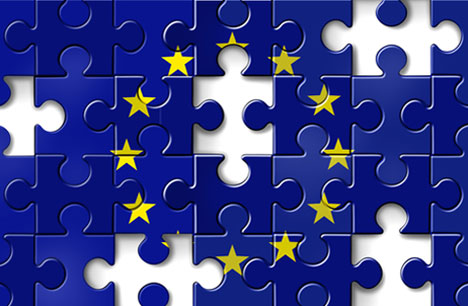Nationalism is a way of deflecting discontent towards a convenient scapegoat, the “other” – an immigrant or Europe. It is a way of mobilizing political support while avoiding any commitment to address the underlying causes of discontent; that’s why it is often described as populism. Xenophobia and euroscepticism can never offer any constructive solutions.
On the contrary the more the nationalist rhetoric succeeds the more our problems multiply and the more we blame the “other”. There is a long and alarming history of deflecting democratic demands by the appeal of nationalism, of which World War I is perhaps the most poignant reminder. In more recent times it is worth noting that sectarian conflicts in both
Bosnia and
Syria were and are ways of responding to, diverting and suppressing democratic movements. In Ukraine, what was a nation-wide protest against corruption and for human rights is rapidly being reframed as a conflict between “eastern” Russians and “European” Ukrainians.
So what is the nature of the underlying discontent? It is a huge frustration and lack of trust in the political class. Despite our right to vote and publicly protest, there is a widespread sense of powerlessness, a feeling that whatever we say or do makes no difference, that established parties are all the same and voting is largely irrelevant.
In democratic theory, a distinction is often drawn between formal or procedural democracy and substantive democracy. Formal democracy is about the rules and procedures of democracy; they include a full adult suffrage, regular elections, freedom of association and media and so on. Substantive democracy is about political equality. It is about being able to influence the decisions which affect your life. And it is about democratic culture – “the habits of the heart” as De Tocqueville put it. Despite the dramatic spread of democratic procedures in recent decades, there is a profound and growing deficit in substantive democracy everywhere. “They call it democracy but it isn’t” was one of the slogans of the Spanish indignados.
There are many reasons for the weakness of substantive democracy. The most obvious reason is globalisation. Procedural democracy is organised on a national basis. Yet the decisions that affect our lives are taken in Brussels, Washington DC, in the headquarters of multinational corporations, or by financial whizz kids in London, Hong Kong or New York, playing the market on their computer screens.
However perfect our democratic procedures at national levels, if the decisions that affect our lives are no longer taken at national levels, then voting cannot affect those decisions. Yet this is not the only reason. Globalization has been a way of escaping what might be described as the sclerosis of the nation-state.
The institutions of the deep state grew in the aftermath of World War II and have become deeply embedded in routines and practices, including the tendencies for control and surveillance that are hard to shift. Political parties turned themselves from being fora for debate about the public interest into electoral machines that through an array of techniques were only able to echo and reinforce already existing prejudices gleaned from focus groups representing the so-called middle ground.
Bureaucracies that developed their own self-reproducing logics included the civil service, the military and intelligence agencies. Where there are political initiatives designed to bring about change they often get caught up in such institutional constraints.
Paradoxically, this statist inertia has been combined with twenty years of neoliberalism supposedly aimed at undermining the state. Yet while neoliberalism has hugely increased inequality and hollowed out welfare, it has left the deep state either untouched or enmeshed with capital through promises of future Directorships and consultancies after retirement.
It has led to a culture of selfish individualism and greatly strengthened the power of money and its hold on the political class. It is the hold of finance over party financing and media that largely explains the persistence of neoliberalism in the post-crash world, as Colin Crouch explains.
When nationhood is fear – what is the alternative?
So how can substantive democracy be restored or indeed brought into being? The answer is not to return decisions to the nation-state because even if that were possible in this interconnected neoliberal context, a return to the nation-state is actually a return to inertia, paternalism, surveillance and fear of the “other”.
Nor is the answer an improvement in the procedures of democracy in the European Union, even though that might be desirable, since procedures without substance will leave us where we are now.
By substantive democracy I mean how can ordinary people influence the decisions that affect their lives in Europe as a whole. I mean post-national democracy in Europe, rather than reviving national democracy or democratising the European Union, although both might be part of the answer. Making this possible, I would argue, requires both bottom-up and top-down transformations.
The bottom-up answer is about opening up the public sphere at all levels, about developing new deliberative and dialogic forms of politics especially at local and transnational levels that build on the 2.0 culture of writing and editing and not just reading. (See Selchow and Moore). It is about devolving the decisions that affect our lives to manageable communities of interest both local and transnational. It is about constructing a diverse and heterogeneous infrastructure of an intensive public engagement.
This is not possible, however, without top-down measures that open up such possibilities. We need a form of global governance that could protect these openings from the storms of globalisation – constraints on financial speculation perhaps through a Tobin tax, regulation of multinational companies including closing down tax havens, or policies to slow down climate change including a carbon tax.
The aim must be to regulate, constrain and tax global bads at the same time as generating revenue at global levels to promote global goods such as stabilising the euro, promoting employment, supporting reforms on transparency and accountability, investing in resource saving and renewable energy, or peace interventions. In other words, the aim of global governance is to create a framework for civilising globalisation in such a way as to make it possible for decision-making to be devolved to the lowest levels and returned to the citizen.
The European Union ought to be such a model of global governance but it would need much greater visibility and accountability. It is not only anti-Europeanism that explains why populist parties have done so well in the European elections. It is also the assumption that European elections do not matter. The European Union is abstract and bureaucratic; the European Parliament is thought to have little power. What is more, voting for the European Parliament is actually undertaken on a national basis. As Anna Topalski points out, you cannot vote for a European party in the European elections, you have to vote for national parties.
Apart from Germany, where there were pictures of Martin Schulz, the socialist candidate for President of the Commission during the elections, there was almost no discussion about future European officials or European policies. Voting in the European election is not about electing a European Parliament it is about protesting national policies. It is okay to be irresponsible in a European election because no one really knows what they are voting for. But actually it is not okay. It sets in motion an anti-European rhetoric that could mean the death of Europe with incalculable consequences.
Transforming the European Union needs a basic change in procedures. Citizenship could be based on residence rather than nationality, empowering immigrants in Europe. Voting should be transnational and based on cross-European parties rather than being national and based on national parties. European elections should take place at a different moment from local and national elections in order to focus on European issues. Perhaps there should also be voting for a European President, so that the Union is associated with a person and not with “a bureaucracy”. But these procedures only make sense if they are associated with a different set of policies that allow for democratisation at other levels.
Finally, a word about my own country, Britain. Already the commentators are calling on political leaders to take up the challenge of UKIP, which topped the poll. They are asking parties to take euroscepticism and concern about immigration seriously. This is exactly what should not happen. Making these issues respectable generates a momentum towards populism that prevents us from addressing the problems of democracy.
So far the Labour leader, Ed Miliband, has resisted those pressures. He doggedly, and quite rightly, talks about the problems of housing, energy prices, the National Health Service and the cost of living. Resisting these pressures is more than an election strategy. This is a strategy for avoiding descent into a nightmarish nationalist cycle of disintegration.
References:
Crouch, Colin. The Strange Non-death of Neo-liberalism. Cambridge: Polity, 2011.
Moore, Henrietta L., and Sabine Selchow. “Global civil society and the Internet 2012: Time to update our perspective.” In: Global Civil Society 2012: Ten Years of Critical Reflection, edited by Mary Kaldor, Henrietta L. Moore and Sabine Selchow. Palgrave, 2012.







